AIIMS CRE Recruitment 2025 is being held to fill various posts in different AIIMS institutes and other central government bodies. The Pharmacist post is one of the important roles in this recruitment. The online application process started on 14 November and will continue till 02 December 2025. Candidates who are interested should start preparing now, as the exam is an important step in the selection process. Knowing the AIIMS CRE Pharmacist Syllabus and Exam Pattern 2025 will help in planning better.
AIIMS CRE Pharmacist Syllabus and Exam Pattern
Aspirants must remember that they will have to prepare thoroughly for the AIIMS CRE Notification 2025, from going through the wide range of topics, understanding the important ideas for basic science details of AIIMS CRE Pharmacist Syllabus 2025.
| AIIMS CRE Pharmacist Syllabus | |
|---|---|
| Particulars | Details |
| Recruitment Organization | Competitive Recruitment Exam (CRE) |
| Post Name | Pharmacist |
| AIIMS CRE Exam Date 2025 | 22nd to 24th December 2025 |
| Mode of Examination | Computer Based Test |
| Website | https://creaiims.aiimsexams.ac.in/ |
| Category | Syllabus and Exam Pattern |
| Negative Marking | Negative marking of 1/4 marks for each wrong answer |
| Exam Scheme |
|
| Qualifying Marks | 40% for UR/EWS, 35% for OBC, and 30% for SC & ST |
AIIMS CRE Pharmacist Syllabus
Although the CRE has not specified the exact syllabus for the Exam in the Notification, but according to the previous year papers and other CRE trends we have prepared a detailed syllabus for our candidates. Here is the detailed AIIMS CRE Pharmacist Syllabus. Aspirants are advised to prepare accordingly and plan their strategy effectively before appearing for the exam.
| AIIMS CRE Pharmacist Syllabus | |
|---|---|
| Subjects | Topics Covered |
| General Knowledge | 1. Budget and Five Year Plans |
| 2. Current Affairs – National and International | |
| 3. Indian National Movement | |
| 4. Sports | |
| 5. Important Days | |
| 6. Indian History | |
| 7. Books and Authors | |
| 8. Awards and Honors | |
| 9. Capitals of India | |
| 10. Indian Economy | |
| 11. Abbreviations | |
| 12. General Policy | |
| 13. Countries and Capitals | |
| 14. International and National Organizations | |
| 15. Science and Technology | |
| 16. Science – Inventions & Discoveries | |
Topics covered in Pharmacy [General, Ayurveda and Homeopathy]
Pharmacist (General)
Topics which will be covered in the AIIMS CRE Pharmacist Syllabus (General) 2025 examination which aspirants must be aware and updated.
| AIIMS CRE Pharmacist Syllabus (General) |
||
|---|---|---|
| S. No. | Subjects | Important Topics |
| 1 | Pharmaceutics | – Formulation and preparation of pharmaceutical dosage forms. – Dispensing and manufacturing processes. |
| 2 | Pharmaceutical Chemistry | – Structure and properties of medicinal compounds. – Synthesis and reactions of drugs. – Analytical techniques. |
| 3 | Pharmacognosy | – Medicinal plants and natural products. – Identification and use of herbs. – Plant-derived drugs. |
| 4 | Biochemistry & Clinical Pathology | – Chemical processes in the body. – Blood and urine analysis. – Laboratory tests and their interpretation. |
| 5 | Human Anatomy & Physiology | – Structure and function of the human body. – Organ systems and their physiological functions. |
| 6 | Health Education & Community Pharmacy | – Health promotion and prevention. – Community pharmacy services. – Patient counseling and education. |
| 7 | Pharmacology & Toxicology | – Drug actions, uses, and side effects. – Toxicological effects of drugs. – Drug interactions and contraindications. |
| 8 | Pharmaceutical Jurisprudence | – Drug regulations and laws. – Ethical practices in pharmacy. – Pharmacy Act and Drug Control. |
| 9 | Drug Store and Business Management | – Managing drug stores and inventory. – Business operations, including financial management and marketing. |
| 10 | Hospital & Clinical Pharmacy | – Hospital pharmacy practices. – Clinical drug monitoring and patient care. – Dispensing medication in clinical settings. |
Pharmacist (Ayurved)
Topics which will be covered in the AIIMS CRE Pharmacist Syllabus (Ayurved) 2025 examination which aspirants must be aware and updated.
| AIIMS CRE Pharmacist Syllabus (Ayurved) |
||
|---|---|---|
| S. No. | Topics | Subtopics |
| 1 | Basic Principles of Ayurveda | Introduction to Ayurveda: Tridosha, Saptadhatu, Malas, Panchamahabhutas, Prakriti, Vikriti Concept of Agni and Ama (digestive fire and toxins) Role of digestive fire in health |
| 2 | Ayurvedic Pharmacology | Herbal Medicine: Common Ayurvedic herbs and their therapeutic uses Pharmacological actions of Ayurvedic herbs (Vata, Pitta, Kapha balancing) Formulations: Kwath, Churna, Asava, Arishta, Bhasma |
| 3 | Dosage and Administration | Ayurvedic dosage forms and administration Preparation and use of Ayurvedic medicines Therapeutic dosages and precautions in drug administration |
| 4 | Pharmaceutical Procedures in Ayurveda | Preparation Techniques: Decoction, Powder, Paste, Infusion, Syrup, Oil and Bhasma Pharmacovigilance: Adverse effects and safety protocols Storage, preservation and labeling of Ayurvedic medicines |
| 5 | Ayurvedic Drug Interactions | Drug-herb interactions Potential side effects of commonly used Ayurvedic drugs Contraindications of Ayurvedic formulations |
| 6 | Ayurvedic Toxicology (Rasa Shastra) | Understanding Toxicity: Identification and management of toxic substances used in Ayurveda Use of Metals and Minerals in Ayurvedic treatment (e.g., Bhasma) |
| 7 | Clinical Application of Ayurvedic Medicines | Treatment of Common Ailments: Diseases of Vata, Pitta, Kapha imbalance and Ayurvedic remedies Specialized Treatments: For digestive disorders, respiratory issues, skin diseases, etc. |
| 8 | Ayurvedic Pharmacognosy | Study of plant and mineral sources of Ayurvedic drugs Collection, identification and preparation of medicinal plants Study of Ayurvedic pharmacopoeia |
| 9 | Basic Medical Sciences for Pharmacists | Anatomy and Physiology: Overview relevant to Ayurvedic treatments Modern Medicine Basics: Interaction of Ayurvedic and allopathic treatments Pathology and Microbiology |
| 10 | Current Trends in Ayurvedic Research | Research methodology in Ayurvedic pharmacology Overview of clinical trials and evidence-based Ayurveda Modern advances in Ayurvedic medicine and formulations |
| 11 | General Knowledge | Ayurveda in the Modern World: Role in contemporary healthcare Healthcare Policies and Regulations related to Ayurvedic drugs General Knowledge: Trends in medicine and healthcare |
Pharmacist (Homeopathy)
Topics which will be covered in the AIIMS CRE Pharmacist Syllabus (Homeopathy) 2025 examination which aspirants must be aware and updated.
| AIIMS CRE Pharmacist Syllabus (Homeopathy) |
|
|---|---|
| Subject | Description |
| Human Anatomy and Physiology (Homeopathy) | Covers the basics of human anatomy and physiology. |
| Introductory Homeopathy | Covers the basics of homeopathy, including tissue remedies. |
| Clinical Pathology and Toxicology (Homeopathy) | Covers clinical pathology and toxicology. |
| Pharmaceutics (Homeopathy) | Covers the study of dosage forms and drug delivery systems. |
| Pharmaceutical Chemistry (Homeopathy) | Covers the chemistry of compounds used in medicine. |
| Health Education and Community Pharmacy (Homeopathy) | Covers health education and community pharmacy. |
| Pharmacognosy (Homeopathy) | Covers the study of pharmacognosy. |
| Social Pharmacy (Homeopathy) | Covers social pharmacy. |
| Pharmacy Laws (Homeopathy) | Covers pharmacy laws. |
AIIMS CRE Pharmacist Exam Pattern
Comprising multiple-choice questions, practical tests and clinical scenario-based evaluations, this approach ensures a balanced evaluation of aspirant’s theoretical knowledge along with their ability to apply medical concepts in practical situations, reflecting the institution’s commitment to a comprehensive medical assessment.
| AIIMS CRE Pharmacist Exam Pattern 2025 |
|
|---|---|
| Exam Pattern | Details |
| No. of Questions | 100 (20 MCQs related to General Knowledge & Aptitude, Knowledge of Computer) and 80 MCQs related to the domain of the respective group |
| Total Marks | 400 Marks |
| Type of Question | Multiple Choice Questions (MCQs) |
| Duration | 90 Minutes |
- The AIIMS CRE 2025 exam will be conducted as a Computer-Based Test (CBT) with a total duration of 90 minutes.
- It will feature 100 multiple-choice questions (MCQs), each carrying 4 marks, with a deduction of 1/4 mark for each incorrect response.
- The exam is divided into five sections, each lasting 18 minutes. Aspirants can only respond to questions within the active section during the allocated time.
- For posts requiring 10th/12th qualifications, the exam will be bilingual (English and Hindi), whereas for technical or higher qualification posts, the exam will be available in English only.
- The minimum qualifying marks are 40% for UR/EWS candidates, 35% for OBC candidates, and 30% for SC/ST and PwBD aspirants.
AIIMS CRE Pharmacist Preparation Tips
Preparing thoroughly with AIIMS CRE Pharmacist Syllabus will surely help the aspirants in achieving the highest merit in the examination, keeping track of their progress will boost them in improving their time management for the actual exam. We have shared few tips and tricks for the aspirants to add in their preparation list.
| Preparation Tips For AIIMS Pharmacist Exam 2025 |
|
|---|---|
| Tips | Details |
| Understand the Syllabus & Exam Pattern | – Familiarize yourself with the syllabus covering Pharmacy, General Knowledge, General English, and Aptitude. – Understand the exam structure, including timing and marks distribution. |
| Focus on Pharmacy-Specific Subjects | – Revise Pharmacology, Pharmaceutics, Medicinal Chemistry, Pharmacy Practice, Pharmacognosy, and Pharmaceutical Analysis. |
| General Knowledge & Current Affairs | – Stay updated on healthcare, pharmacy, and government policies through newspapers, magazines, and online portals. |
| Improve General English Skills | – Focus on grammar, vocabulary, and reading comprehension. – Practice English MCQs and read regularly to improve language skills. |
| Strengthen Aptitude & Reasoning Skills | – Solve practice problems in quantitative aptitude, logical reasoning, and data interpretation. – Focus on speed and accuracy. |
| Practice Previous Year Papers | – Keep Solving past year question papers to understand the exam format and question types. – Time yourself to improve speed. |
| Mock Tests & Online Practice | – Take online mock tests to track your progress. – Analyze wrong answers to work on weak areas. |
| Focus on Time Management | – Practice completing each section in the allotted time of 18 minutes. – Prioritize sections based on your strengths and weaknesses. |
| Stay Consistent & Healthy | – Stick to a study schedule and stay consistent. – Maintain a healthy lifestyle to keep focused and energized. |
| Revision & Last-Minute Tips | – Revise key concepts rather than learning new topics in the final days. – Ensure all essential materials (admit card, ID proof) are ready. |
| Related Posts |
| AIIMS Lab Attendant Syllabus |
| AIIMS Salary |
| AIIMS CRE Previous Year Question Paper |

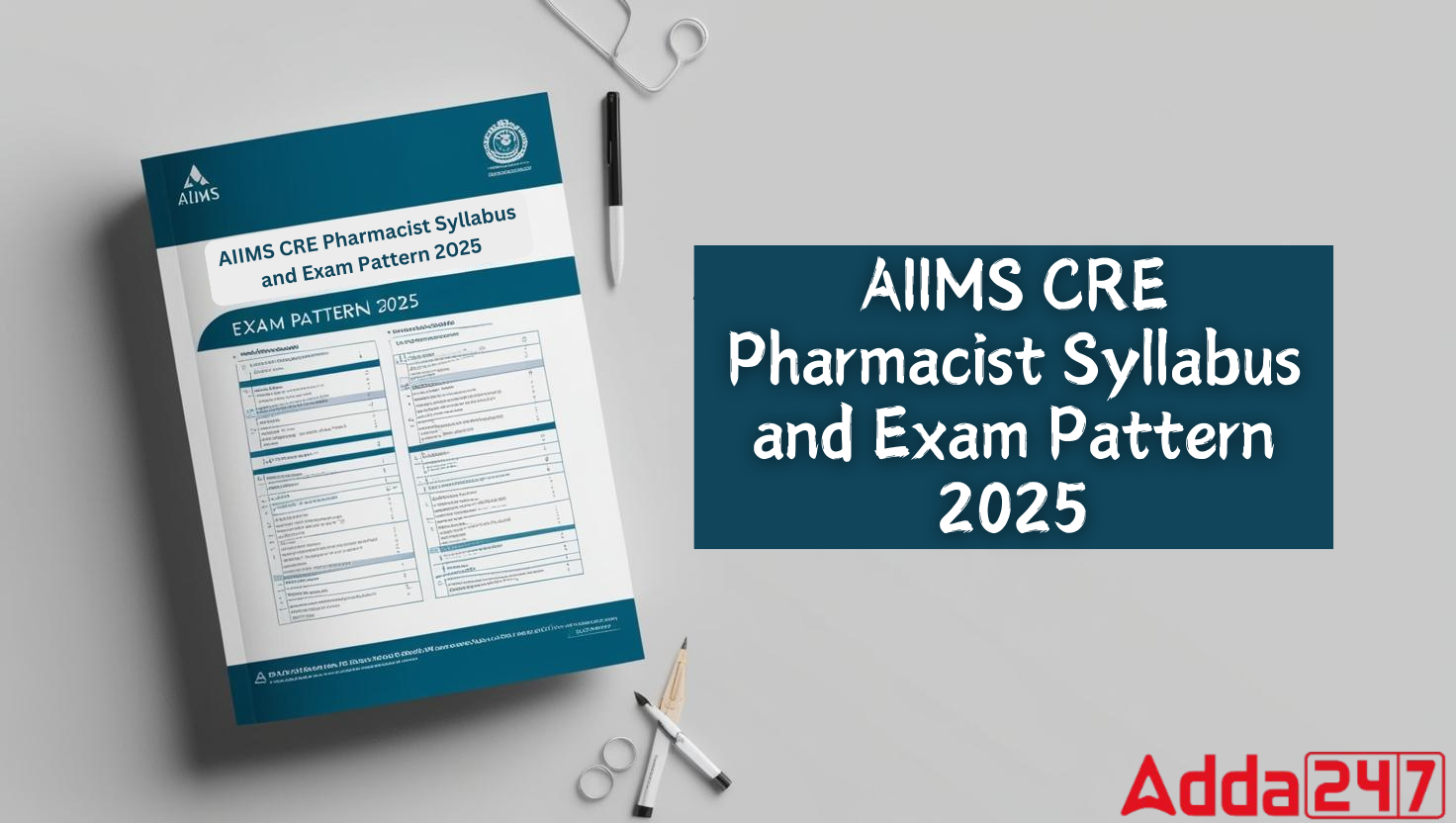
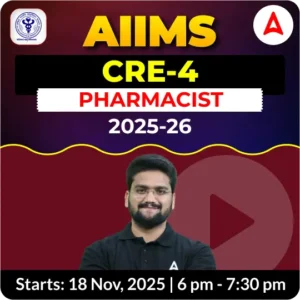

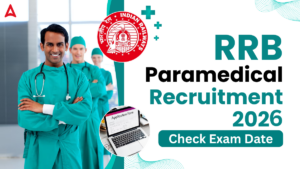 RRB Paramedical Exam Date 2026, Check Te...
RRB Paramedical Exam Date 2026, Check Te...
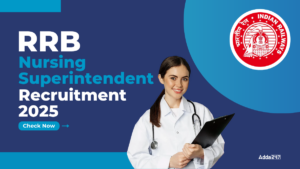 RRB Nursing Superintendent Exam Date 202...
RRB Nursing Superintendent Exam Date 202...
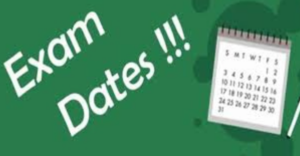 RRB Pharmacist Exam Date 2026, Check Ten...
RRB Pharmacist Exam Date 2026, Check Ten...
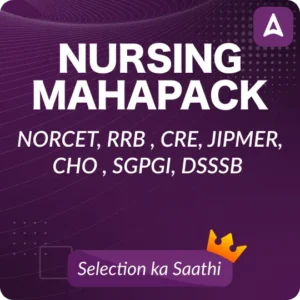
 Adda247 Job portal has complete information about all Sarkari Jobs and Naukri Alerts, its latest recruitment notifications, from all state and national level jobs and their updates.
Adda247 Job portal has complete information about all Sarkari Jobs and Naukri Alerts, its latest recruitment notifications, from all state and national level jobs and their updates.



